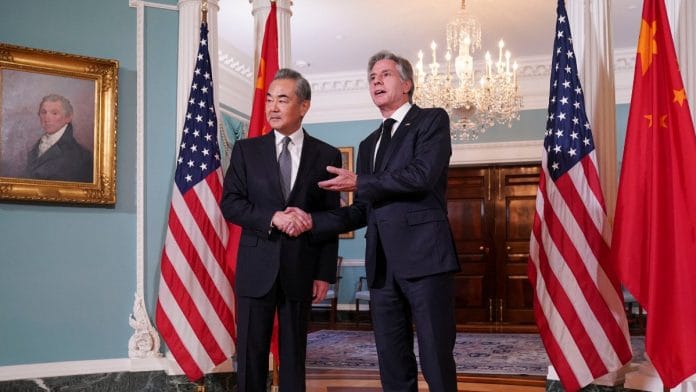New Delhi: US Secretary of State Antony Blinken and China’s Foreign Minister Wang Yi exchanged views on the ongoing Israel-Hamas war in a phone conversation Wednesday, agreeing to maintain communication on the situation in the Middle East.
The readouts about the call by the two foreign ministries, however, significantly differed on two issues – a “two-state solution” for Israel-Palestine and the reported attack on commercial ships in the Red Sea by Yemen’s Houthis.
Secretary Blinken stressed on the need for a “two-state solution” to the Israel-Palestine issue, the Chinese foreign ministry said, adding that Wang too emphasised that any solution to the Gaza crisis could not deviate from that.
It also added Blinken’s response to the Houthi threat in the Red Sea, saying attacks on commercial vessels “pose an unacceptable threat to maritime security and international law”.
Beijing’s statement, however, did not mention the attacks that the Iran-aligned group says are in support of Palestine.
Yemen’s Houthi rebels have reportedly attacked three commercial vessels in the southern Red Sea, claiming two of them were Israeli. The Israeli army has, however, said the ships had no link to Israel.
Last week, China presented a four-point peace plan to the United Nations on ending the Israel-Hamas conflict, which has killed more than 16,000 Palestinians and 1,200 Israelis, according to casualty figures shared by their administrations.
‘San Francisco vision’, Taiwan issue
Wednesday’s conversation between Blinken and Wang follows US President Joe Biden and Chinese President Xi Jinping’s first bilateral meeting in over a year, held in Woodside, California last month, on the sidelines of the Asia-Pacific Economic Cooperation (APEC) Economic Leaders’ Week conference, chaired by the US.
Both countries had agreed to resume high-level, military-to-military communication, defence policy coordination talks, maritime consultative agreement meetings and telephone conversations between theatre commanders, the White House had said.
On Wednesday, Blinken and Wang referred to the significance and success of the San Francisco meeting and noted the importance of building upon the progress made on key issues.
Wang emphasised on the “San Francisco Vision” for the future and the need to “promote the improvement and development of Sino-US relations in a healthy, stable and sustainable direction”.
He also reiterated China’s position on Taiwan, demanding “that the United States not interfere in its internal affairs” or “support or condone any ‘Taiwan independence’ forces”.
Washington has repeatedly emphasised that Taiwan’s election “must be free from outside interference”. Last year, then-US Speaker Nancy Pelosi became the highest-ranking US official to visit the island nation in over two decades. China strongly condemned the visit, calling it a “provocation” by Washington.
China has recently stepped up its military pressure against Taiwan to try and push the island nation into accepting Beijing’s sovereignty, despite strong objections from the Taipei government. Taiwan goes to elections in January next year.
(Edited by Tikli Basu)
Also read: Commonwealth releases ‘military justice principles’, 2 Indians among 15 experts who drafted rules






